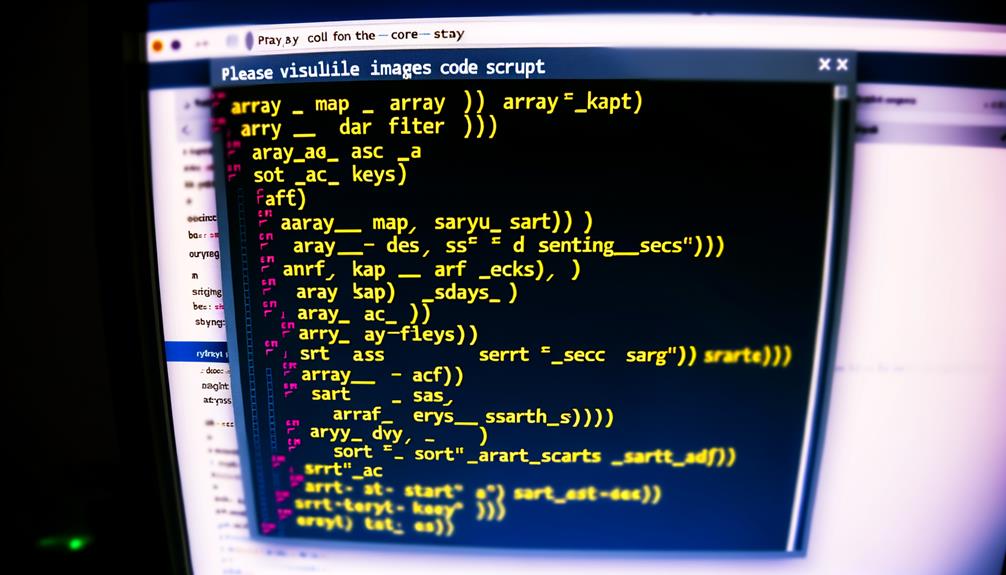As developers, we're constantly seeking ways to optimize our code and improve our efficiency.
It's often said that mastering PHP array functions and constants can significantly elevate our programming prowess. But are there truly 15 key functions and constants that can revolutionize our array manipulation game?
As we delve into this topic, we'll uncover a wealth of practical tools that not only simplify array operations but also enhance the flexibility and power of our code.
Join us as we unravel the array functions and constants that are poised to become indispensable assets in your development arsenal.
Array Creation Functions

Array creation in PHP involves the utilization of various functions to generate and assemble arrays, facilitating efficient and organized data storage and retrieval within the programming language. We've a range of array functions at our disposal.
The `array()` function is used to create a new array.
If we need to combine two arrays into one, we can employ the `array_combine()` function.
When we want to split an array into smaller chunks, the `array_chunk()` function comes in handy.
Additionally, the `compact()` function allows us to create an array using variables as keys and their values as values.
Lastly, the `range()` function is useful for generating an array with a specified range of values.
These functions empower us to efficiently manage and manipulate arrays, enhancing our programming experience.
Array Comparison Functions
Comparing arrays is a fundamental aspect of array manipulation in PHP, allowing for the identification of differences and intersections between arrays. PHP offers a range of powerful array comparison functions to facilitate this process.
Functions such as array_diff() and array_intersect() enable us to efficiently calculate the variance and common elements between arrays.
For more nuanced comparisons, functions like array_diff_assoc() and array_intersect_assoc() take into account both values and keys.
These array functions empower developers to liberate their coding potential by simplifying the task of array analysis and comparison.
With these tools at our disposal, we can confidently navigate the complexities of array manipulation, ensuring that our code is efficient, precise, and tailored to our specific needs.
Array Modification Functions
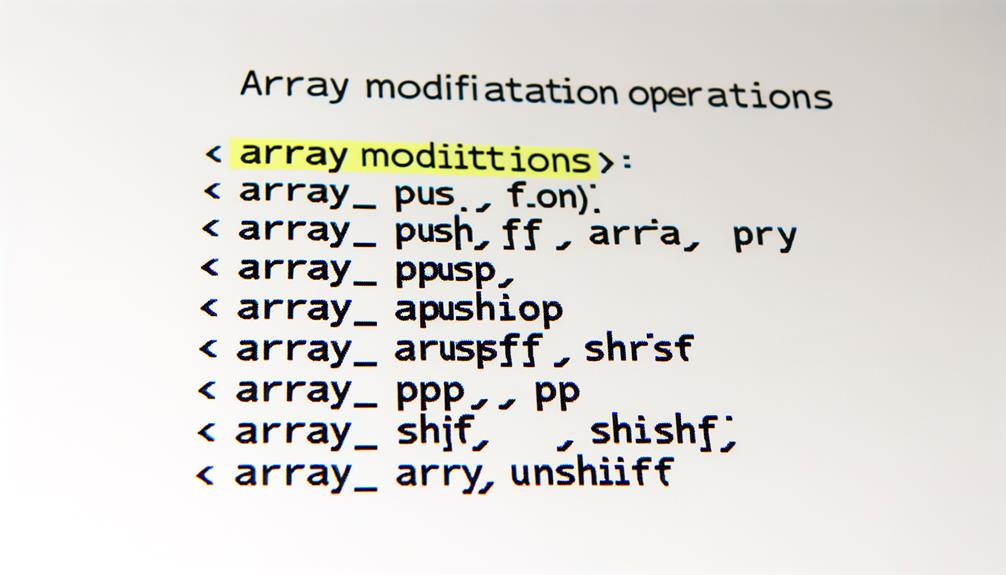
As we delve into the array modification functions, we encounter a diverse set of tools that empower us to efficiently manipulate arrays and tailor them to our specific requirements.
Here are some key array modification functions to bookmark:
- `array_merge()`: Easily merge two or more arrays into a single array.
- `array_push()`: Conveniently add one or more elements to the end of an array.
- `array_replace()`: Effortlessly replace values of the first array with values from the second array for matching keys.
- `array_reduce()`: Seamlessly reduce an array to a single value using a callback function.
With these powerful functions at our disposal, we've the freedom to modify arrays with ease and precision, empowering us to create custom solutions for our programming needs.
Element Removal and Reordering Functions
We will now explore functions that facilitate the removal and reordering of elements within arrays, enhancing their flexibility and usability.
PHP offers a range of powerful functions for manipulating array elements. The 'array_pop()' and 'array_shift()' functions allow us to remove elements from the end and beginning of an array, respectively.
Conversely, the 'array_unshift()' function enables us to add one or more elements to the beginning of an array, while 'array_splice()' provides the capability to remove a portion of an array and replace it with new elements.
Additionally, the 'array_unique()' function efficiently removes duplicate values from an array, returning a new array with unique values.
These functions empower us to efficiently manage and optimize the content of arrays, providing greater control and flexibility in array manipulation.
Sorting and Shuffling Functions
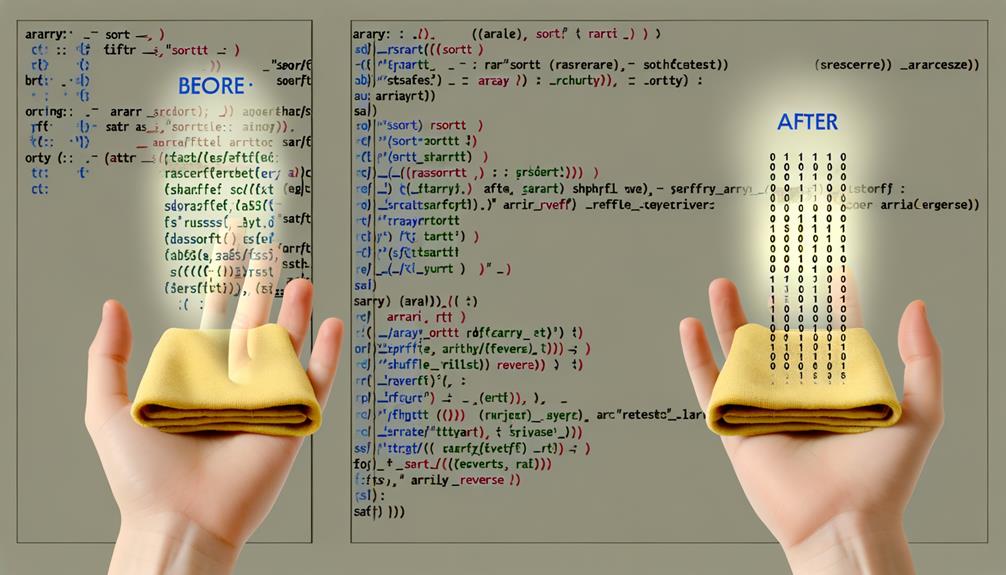
Having explored functions for element removal and reordering, we'll now delve into the efficient and versatile capabilities offered by PHP's array sorting and shuffling functions.
- arsort(): Sorts an associative array in descending order, preserving key-value associations.
- asort(): Sorts an associative array in ascending order.
- rsort(): Sorts an indexed array in descending order.
- usort(): Sorts an indexed array using a user-defined comparison function.
PHP's array sorting functions provide powerful tools for organizing data in both associative and indexed arrays, allowing for seamless manipulation and presentation of information. These functions empower us to tailor the order of elements to suit our specific needs, facilitating a sense of liberation and control over the data.
Key Case and Reversing Functions
Exploring the capabilities of PHP's key case and reversing functions reveals a versatile set of tools for manipulating array keys and reversing the order of elements with ease and precision.
With 'array_change_key_case()', keys can be converted to lowercase or uppercase, offering flexibility in data retrieval and manipulation. This function allows for a seamless transition between different key case formats, streamlining array operations.
Additionally, 'array_reverse()' effortlessly reverses the order of elements within an array, providing a quick solution for rearranging data as per specific requirements.
These functions empower developers to efficiently manage array structures, enhancing the overall flexibility and usability of PHP arrays.
Other Array Functions
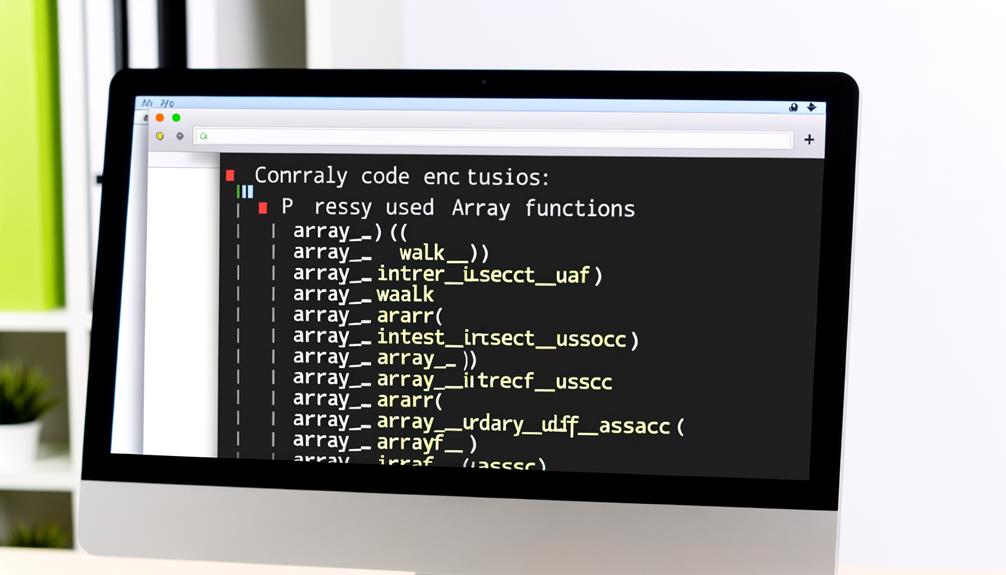
The array functions in PHP offer a wide range of capabilities for manipulating and managing arrays efficiently. Here are some other array functions that can be quite handy:
- shuffle(): Randomly shuffles the elements of an array, adding an element of surprise to your data manipulation.
- natsort(): Sorts an array using a natural order algorithm, making it ideal for sorting arrays with numbers.
- array_walk(): Applies a user-defined callback function to each element of an array, empowering you to customize array operations.
- array_unique(): Removes duplicate values from an array and returns a new array with unique values, ensuring data purity and consistency.
These functions, along with others, provide the freedom and flexibility to efficiently work with arrays, enhancing the overall development experience.
Array Calculations & Returns
Array calculations and returns involve performing various operations and obtaining specific values from arrays in PHP.
When manipulating arrays, the array_keys() function is useful for retrieving all keys or a subset of keys from an associative array.
Additionally, array_column() allows us to extract values from a single column of a multi-dimensional array and return them as a new array.
For random key retrieval, array_rand() comes in handy.
Furthermore, for numerical calculations, array_product() efficiently calculates the product of all values in an array, while array_sum() computes the sum of all values.
These functions empower developers with the ability to efficiently process and retrieve data from arrays, providing a liberating experience for PHP programmers.
Counting and Retrieving Values
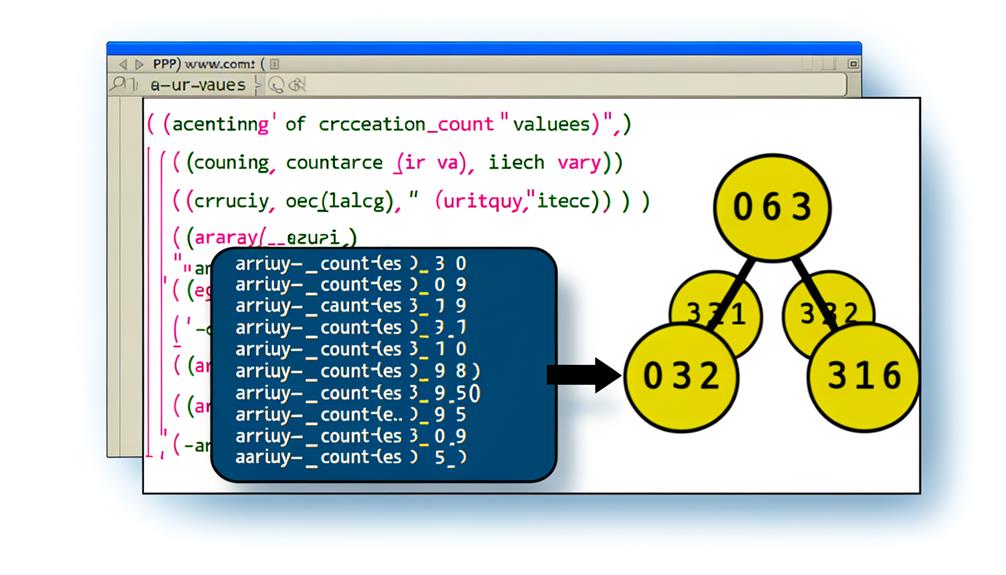
We can efficiently retrieve values from arrays using the `count()` function to obtain the number of elements and the `current()` function to access the value of the current element in the array.
- Use `count()` to get the total number of elements in an array.
- Utilize `current()` to access the value of the current element in the array.
- Leverage `key()` to retrieve the key of the current element in the array.
- Employ `extract()` to import variables from an associative array into the current symbol table.
Manipulating Array Pointers
Navigating through an array and accessing its elements can be efficiently achieved by manipulating the array pointers. This allows us to control the position within the array, enabling seamless traversal and manipulation. Here's a table summarizing the PHP array functions for manipulating array pointers:
| Function | Description |
|---|---|
| prev() | Moves the internal pointer to the previous element |
| end() | Moves the internal pointer to the last element |
| reset() | Moves the internal pointer to the first element |
| each() | Returns the current key-value pair and advances the internal pointer |
Array Constants

Discussing array constants, we'll delve into their significance within PHP programming and how they contribute to the stability and predictability of array operations.
- `SORT_ASC`: Specifies ascending order.
- `SORT_DESC`: Specifies descending order.
- `SORT_NUMERIC`: Indicates that elements should be treated as numeric values when sorting.
- `SORT_REGULAR`: Indicates that elements should be compared in their original data types.
Array constants play a crucial role in ensuring consistent and reliable array manipulation. They provide a standardized way to define sorting orders and data types, promoting clarity and ease of maintenance in PHP code.
Sorting Constants
With sorting constants, developers can precisely define the order and data type for array manipulation, ensuring consistent and predictable behavior in PHP programming.
The SORT_ASC constant specifies ascending order, while SORT_DESC indicates descending order, providing flexibility in sorting arrays.
Additionally, SORT_NUMERIC ensures that elements are treated as numeric values during sorting, while SORT_REGULAR compares elements in their original data types.
For case sensitivity, developers can utilize CASE_LOWER to convert keys to lowercase and CASE_UPPER to convert keys to uppercase.
Furthermore, the SORT_STRING constant specifies that elements should be treated as strings during sorting.
These constants empower developers to tailor sorting operations to their specific requirements, enhancing the efficiency and effectiveness of array manipulation in PHP.
Data Type Constants
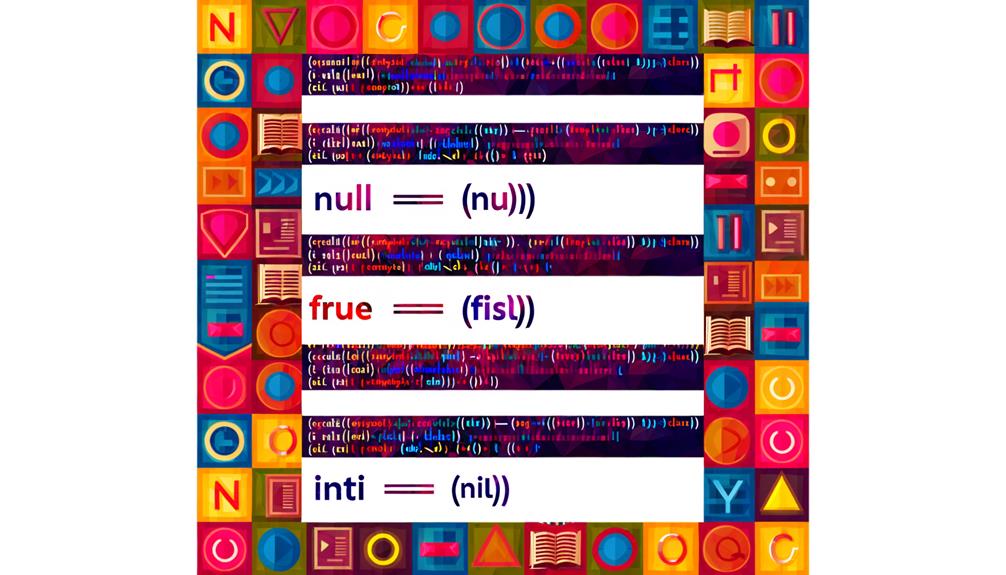
Data Type Constants build upon the foundation established by the Sorting Constants, offering precise control over the data types and order for array manipulation in PHP.
When working with arrays in PHP, understanding the data type constants is crucial for accurate sorting and comparison operations. Here's a quick rundown of the essential data type constants to remember:
- `SORT_NUMERIC`: Ensures that elements are treated as numeric values when sorting.
- `SORT_REGULAR`: Compares elements based on their original data types.
- `SORT_STRING`: Specifies that elements should be treated as strings during sorting.
- `CASE_LOWER` and `CASE_UPPER`: Control the case conversion of keys to lowercase or uppercase.
These constants provide the necessary flexibility to handle various data types and sorting requirements, empowering developers with precise array manipulation capabilities.
Case Constants
Case constants in PHP provide a reliable and flexible means of controlling the case conversion of keys within arrays, ensuring precise manipulation and comparison operations. When working with arrays, it's essential to have control over the case of keys for consistency and accuracy. PHP offers two case constants for this purpose: `CASE_LOWER` and `CASE_UPPER`. These constants allow developers to convert keys to either lowercase or uppercase, respectively, providing the freedom to choose the appropriate case for their specific use case. This ensures that array keys are consistently formatted, enabling smooth and effective array operations.
| Case Constants |
|---|
| `CASE_LOWER` |
| `CASE_UPPER` |
Note on Content

After reviewing the array functions and constants in PHP, it's important to note the significance of understanding and effectively utilizing these tools in array manipulation.
- Mastering these array functions and constants empowers us to efficiently manipulate and transform arrays, enhancing our coding proficiency.
- The ability to compare, modify, sort, and extract data from arrays liberates us from repetitive and time-consuming tasks, allowing us to focus on more complex problem-solving.
- Understanding array calculations and returns equips us with powerful tools for performing mathematical operations and retrieving specific values from arrays.
- Proficiency in manipulating array pointers enables us to navigate and extract data from arrays with ease, streamlining our coding processes.
Frequently Asked Questions
What Are Some Best Practices for Using PHP Array Functions to Optimize Performance and Memory Usage?
We optimize performance and memory usage when using PHP array functions by considering the following best practices.
- Use array functions that directly manipulate arrays to reduce memory consumption.
- Employ built-in functions like array_merge and array_filter to enhance performance.
- Leverage array functions like array_keys and array_column to retrieve specific elements, improving efficiency.
- Employ array functions that modify keys and values, such as array_change_key_case, to optimize memory usage.
How Can I Effectively Handle Multi-Dimensional Arrays Using PHP Array Functions?
Handling multi-dimensional arrays effectively using PHP array functions involves utilizing functions like:
- array_merge_recursive() for merging nested arrays
- array_column() for extracting values from a specific column
- array_walk_recursive() for iterating through all elements, including nested arrays
Additionally, you can use:
- array_filter() to conditionally filter elements
- array_map() for applying a callback function to each element
These functions provide efficient ways to manage complex data structures.
Are There Any Specific Array Functions That Are Particularly Useful for Working With Associative Arrays?
There are specific PHP array functions particularly useful for working with associative arrays. Functions like array_keys() retrieve keys, array_column() extracts values from a single column, and array_combine() creates a new array by combining two arrays.
These functions simplify associative array manipulation and retrieval. They're valuable tools for efficient and effective associative array operations, enhancing the overall development experience.
Can PHP Array Functions Be Used to Perform Data Validation and Sanitization on Arrays?
Yes, PHP array functions can be used to perform data validation and sanitization on arrays.
Functions like array_filter() and array_map() are particularly useful for this purpose.
They allow us to apply callback functions to filter and modify array elements based on specific conditions, ensuring that the data meets our validation and sanitization requirements.
These functions provide a powerful way to manipulate array data while maintaining data integrity.
Are There Any Specific Considerations or Limitations When Using PHP Array Constants in Different PHP Versions or Environments?
When using PHP array constants, it's important to be aware of potential considerations and limitations across different PHP versions or environments.
These constants, such as SORT_ASC and SORT_DESC, may behave differently based on the PHP version or server configuration.
It's crucial to consult the PHP documentation and conduct thorough compatibility testing to ensure consistent behavior across various environments.
Understanding these nuances is vital for reliable and compatible code execution.
Conclusion
In conclusion, the PHP array functions and constants we've explored offer a wealth of tools for efficient array manipulation.
From creating and comparing arrays to modifying, sorting, and shuffling elements, PHP provides a robust set of capabilities.
By utilizing the array constants for sorting orders, data type treatments, and key case conversions, developers have even more options at their disposal.
These functions and constants are essential additions to any developer's toolkit, making array manipulation a breeze.


